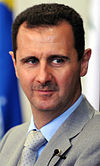Syrian parliamentary election, 2012
|
|
|||||||||||||||||||||||||
|---|---|---|---|---|---|---|---|---|---|---|---|---|---|---|---|---|---|---|---|---|---|---|---|---|---|
|
|||||||||||||||||||||||||
|
All 250 seats to the Parliament of Syria 126 seats are needed for a majority |
|||||||||||||||||||||||||
|
|||||||||||||||||||||||||
|
|||||||||||||||||||||||||
Mohammad Jihad al-Laham
Ba'ath Party
A parliamentary election to the Syrian People's Council was held in Syria on 7 May 2012, following the approval of a new constitution of Syria, in a referendum on 26 February 2012.
The elections were postponed from May 2011 to February 2012 and then again, due to the civil war and the referendum on a new constitution. The 250-seat parliament's term expired March 2011 but it was extended in accordance with the country's new constitution. Only a few days before the date announced, peace envoy Kofi Annan said he was awaiting a response from the Syrian leader on "concrete proposals". He had submitted these to him in two rounds of talks in Damascus at the weekend prior to the announcement on the election. On 13 March, President Assad signed decree №113 setting the election on 7 May 2012. The date of polls was announced on the day when Syrian pro-government forces launched a fresh assault on rebel strongholds in the country’s northwest.
The 7 May election was the first to follow the constitution's new outline for political plurality, revoking a clause put in place by Assad's father, Hafez al-Assad, who ruled for nearly 30 years until his death in 2000. The clause stated that Assad's ruling Baath Party was "leader of state and society". Under the new constitution, parties cannot be founded on a religious, tribal, regional, denominational, or profession-related basis or be a branch of or affiliated to a non-Syrian party or political organisation. This would exclude the outlawed Muslim Brotherhood or Kurdish parties seeking regional autonomy. Also, at least half of the members of the assembly should be workers and farmers, as defined by law. In July 2011, the Syrian cabinet endorsed the general elections bill as part of the government's reform program to end months of unrest. The bill stipulates the formation of the Supreme Commission for Elections to manage the election process. Nine newly licensed parties have been formed to challenge the front dominated by the Baath Party, which has ruled since 1972. The elections were conducted through identity card according to the decree №125 from 2011.
...
Wikipedia

